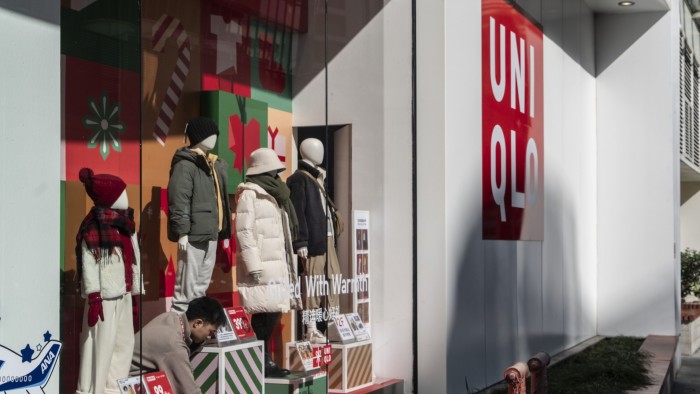Stay informed with free updates
Simply sign up to the Retail & Consumer industry myFT Digest — delivered directly to your inbox.
Fast Retailing shares fell on Monday after comments by its billionaire founder on cotton from the Uyghur region of Xinjiang set off a social media storm in China and raised concerns about boycotts of its Uniqlo stores.
In a BBC interview last week, Tadashi Yanai said Uniqlo did not use cotton sourced from the north-western region, before declining to comment further as the issue was “too political”.
The comments set off a public outcry on Chinese social media, with threats to boycott the Japanese group. The hashtag “Uniqlo founder said not using cotton from Xinjiang” briefly trended as the second most searched topic on the Sina Weibo network on Friday, according to state media.
Uniqlo said it was “monitoring the situation carefully” and declined to comment further.
Fast shares fell as much as 4.5 per cent before recovering some ground by market close in Tokyo, but were still down 1.3 per cent as the Nikkei 225 finished 0.8 per cent higher.
The Japanese group is the latest international clothing company to find itself affected by the tensions between China and western governments over sourcing from cotton-rich Xinjiang.
Beijing strongly rejects accusations by the UN High Commissioner for Human Rights and independent watchdogs that it is responsible for human rights abuses against Xinjiang’s mainly Muslim Uyghur ethnic group, including the widespread use of forced labour.
Earlier this year, China accused the parent company of Calvin Klein of boycotting cotton from Xinjiang, threatening for the first time to put a US company with significant interests in the country on a national security blacklist.
Japanese companies with significant exposure to China live in constant fear of mass rejection by consumers, and of constraints in marketing their goods. Japanese consumer products and cosmetics companies, including Kao and Shiseido, suffered a significant hit in 2023 following Japan’s decision to release radioactive water from its stricken Fukushima nuclear plant into the Pacific Ocean.
Uniqlo, which is fighting to eclipse Zara owner Inditex and H&M as the world’s biggest mass-market clothing retailer, has come to rely on China as one of the biggest drivers of its business.
It first entered the country in 2002 and has so far mostly avoided geopolitical tensions as its functional fashion was snapped up by consumers.
Of the ¥3.1tn ($21bn) in sales in its year ending in August 2024, Greater China accounted for ¥677bn or 22 per cent. The company operates more than 1,000 stores in the region — more than in its home market.
In a separate interview with Japan’s Nikkei newspaper in October, Yanai said China was crucial to production and this was unlikely to change.
“There is no easy way to build large-scale factories to replace the ones in China, where we have years of history of trial and error. Vietnamese factories cannot be as good as the Chinese factories unless we send a significant number of [Japanese] people there”, Yanai told the Nikkei.
Jefferies analysts believe the “trade war” around removing Xinjiang cotton globally “will escalate in 2025”.
“We believe the US and EU governments are currently providing window guidance to companies like Nike, Adidas, Fast Retailing and PVH, among others, to ensure removal of Xinjiang cotton from their raw material list,” they said in a note last month.
“After this campaign, we expect Xinjiang cotton to appear only in China’s domestic sportswear market, used by domestic brands including Anta, Li-Ning and Xtep, among others,” they added.


